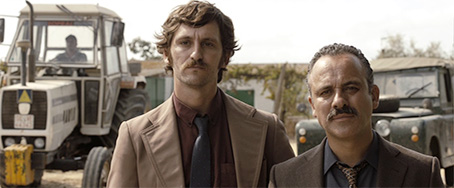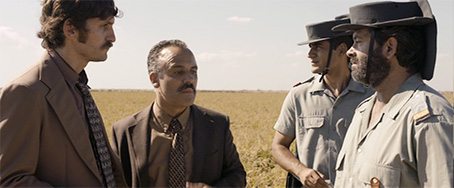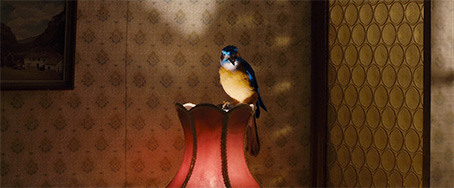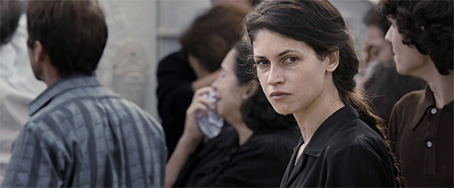|
It's not often that I become hypnotised by an opening credits sequence, but the one that fronts director and co-writer Alberto Rodríguez's intriguingly titled Marshland [La isla minima] had me goggle-eyed with wonder. A cinematic slideshow constructed from aerial views of the Guadalquivir marshes, the landscape is transformed by the dizzyingly high angle from which it is being observed into a series of breathtakingly beautiful and richly textured fractal paintings.* What significance this imagery will have on what follows is anybody's guess at this stage, but this extreme and disorientating viewpoint will be repeated a number of times as the story unfolds.
Marshland takes place in late 1980 Spain at a time of continuing political and financial turmoil for the country. The Franco years were behind it but the stabilising influence of Felipe Gonzalez's Socialist government was still two years away. As the film proper opens, two men whose car has broken down on a marshland dirt road hitch a lift in the trailer of a passing tractor. Taciturn and unsmiling, you could easily mistake them for professional killers who have come to the district to carry out a paid hit. They are soon revealed to be homicide detectives who have been temporarily transferred from Madrid to this small southern town to investigate the disappearance of two teenage girls. Foul play is suspected and is confirmed when the abused and mutilated bodies of both girls are found dumped in the marshland, and the signs are that they were not this killer's only victims.

The out-of-town detective who rolls into a small community to investigate a murder has for some years been a popular component of American crime cinema, as has the concept of teaming two detectives whose differences will prove initially disruptive but later allow them to learn from each other. Such is also the situation here. Forced to share a room due to their breakdown-enforced late arrival at their hotel, the sullen Pedro is offended by the crucifix decorated with pictures of fascist leaders that adorns the wall, something that clearly does not bother the older Juan, and while Pedro makes concerned phone calls home to his pregnant wife, Juan passes no opportunity to eat and drink and womanise. Their first real conversation, tellingly held as they shoot pellets at a sideshow rifle range, confirms their ideological differences, though this seems to bother the ambitious Pedro more than the comparatively upbeat Juan, a man who – if his younger colleague is to be believed – is not the most upright of policemen. But both are good detectives who take their jobs seriously, and they are always professional in their work and their official dealings with each other. There's even an evolving degree of mutual respect and understanding that sees them look out for each other from an early stage – when the mutilated bodies of the missing girls are first discovered, Juan claims he has left his notebook in the car and asks Pedro to retrieve it, giving the less experienced man the chance to throw up out of the view of the local police.
Even by the standards of police procedurals, Marshland is unusually focussed in its narrative, with the entire story shown exclusively from Juan and Pedro's viewpoint. Intermittently, they separate to pursue individual lines of enquiry, but the film always stays with one of them, which has the effect of making us part of the investigating team and ensures that we only know as much as they do at any stage. Both men seem willing to bend the rules to get to the truth, with Pedro doing deals with a sleazy tabloid photographer and Juan putting the serious frighteners on a woman to force her to reveal a crucial piece of information. Later, both agree to let a local drug kingpin ply his trade unmolested in exchange for the description of what might be the killer and his car. It's this scene in particular that separates Marshland from the genre norm, as where most such films would treat us to an ethical debate between the detectives about the rights and wrongs of what they are about to do, here it's agreed in the smallest of nods. Both men know what's needed to close this deal, and at this stage have no qualms at all about making it happen.

This lack of interpersonal conflict does result in a film of largely consistent tone, as Pedro and Juan talk to witnesses, chase up clues, and do underhand deals without a trace of the sub-genre's usual dramatics. In theory this should make Marshland pedestrian viewing at best, but it's anything but, with the low-key performances, storytelling economy and well timed reveals making for consistently gripping viewing from the opening scenes. Although for the most part evenly paced, there are no wasted moments or lingering character asides, and every scene feels underscored by a sense of urgency and hidden menace. Mood is crucial here, with the working relationship between the two leads, their cool determination and the nature of the crimes having more than a whiff of first season True Detective about it, while the setting and tone can't help but recall Bong Joon-ho's superb Memories of Murder. This restrained approach also ensures that when director Rodríguez wants to deliver a jolt – and there are several choice examples here – or a sudden burst of action, the effect is more pronounced for being such a disruption to the consistency of the surface calm.
The investigation is also tellingly underscored by the politics of the time and place, so much so that if you know little about Spain's transition from dictatorship to democracy then I'd seriously suggest a little reading is in order before watching the film, at least if you're going to get the most from the deft manner in which this element is interwoven. Ever present in the news reports of protests and strikes, and closer to hand in the form of a dispute between workers and a wealthy local employer, the political undertow intermittently pops to the surface in the fascistic aggression of Juan's interrogation technique, a method his more liberal partner condemns but later repeats and takes a dangerous step further. Politics are revealed to be behind the reason that Juan and Pedro have found themselves assigned to this case, and it even provides the film with a conclusive sting, one that pertinently suggests some of the country's biggest monsters will never be brought to justice.

I'll freely confess that I've always been a fan of police procedural dramas and thrillers, but rarely come across one as compelling, tightly structured and unwaveringly character-centric as Marshland. There's not a wrong note anywhere in the performances here, and Rodríguez even includes a couple of unexplained and borderline surreal moments involving Juan's faltering health and the appearance of birds, one of which feels almost like a Lynchian dream vision and prompts this hardened detective to faint on the spot. Despite its minimalist air and refusal to shout when a whisper will do the job, it's as tense, gripping and satisfying a big screen crime thriller as you're likely to see all year, and one whose political substructure is so much more than just period window dressing.
As standard definition transfers go, this is one of the best I've seen in some while. Detail is very good, the colours delicious (the title sequence is a feast for the eyes) and the contrast perfectly pitched, nailing the black levels but never losing important picture detail when the light levels drop, which they frequently do. As you'd expect from a digitally shot and (we presume) sourced film, there's not a dust spot or mark to be seen anywhere.
You can choose between Dolby 2.0 stereo and Dolby 5.1 surround, and while the stereo track is perfectly serviceable, the 5.1 really is the only way to go. Everything from the music to the location ambient sound feels richer, with more punch to the bass and a more inclusive spread to the mix. The surrounds are also put to lively use, including specific placement of some sound effects (I actually turned my head to double check when a fly buzzed behind me). A first-class job.

The English subtitles are clear but burned in, though if there is only one line of translation it sits in the black border area, which is welcome.
Making of (20:20)
A useful look at the making of Marshland built primarily around an interview with director Rodríguez, who discusses the origins of the project, the parallels to the politics of modern day Spain, the characters, the importance of rehearsal, the (invisible) digital effects, the title sequence, and more. Actors Javier Gutiérrez (Juan), Raúl Arévalo (Pedro), Antonio de la Torre (the girls' father, Rodrigo), Nerea Barros (their mother, Rocío) and Jesús Castro (local playboy and chief suspect Quini) talk about their characters and the difficulties filming in marshland areas created, and there are snippets of rehearsals and on-location footage.
Trailer (1:43)
Pace is everything in this slightly misleading sell in which most of the shots are less than a second long, and are jump-cut if they stay on screen for longer.
An excellent detective thriller that had me hooked from its opening scene for reasons I've genuinely had trouble nailing down, and once I started watching there was no pausing to grab a drink or nip off to the loo. A strong presentation on Altitude's DVD, but the consistently arresting imagery did make me pine for a Blu-ray release – I'll bet that opening title sequence is jaw-dropping in HD. If you can live with good quality SD, highly recommended. But please, someone release this on Blu-ray.
* The images are in fact aerial photos of the region taken some years ago by Hector Garrido, which were treated digitally to add animation and give them the look of filmed footage.
|